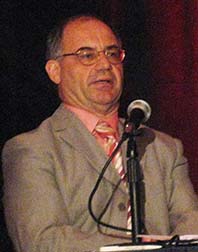
By Rudolf Elmer, guest comment
May 20, 2014
Rudolf Elmer is a Swiss whistleblower who has been persecuted by the Swiss justice system for revealing tax evasion facilitated by the Julius Bär Bank in Zurich. He comments on the Justice Department deal with Credit Suisse, whose egregious money-laundering for 22,000 U.S. tax-evading accounts was exposed by Senate hearings led by Sen. Carl Levin. The settlement requires Credit Suisse to pay $2.6 billion in penalties, with no requirement that it turn over the names of U.S. tax evaders. The U.S. could have withdrawn the bank‘s license to practice in America. It declined to use that leverage.
It is an exceptionally good deal for Credit Suisse. The fine is about a quarter‘s net profits, and that does not hurt CS nor does it have the effect that top management will receive reduced benefits or face a court trial. CS is still too big to jail.
The key matter, however, is that client data has not been provided, and only then can you know if the fine is reasonable or not. There should have been a clause allowing adjustment of the fine if it turns out that the evaded money and other assets are much more than expected. I do not think that such a clause exists in the deal. By the way, that is common business practice if there is uncertainty about a price and only the future will tell how much the real or effective price is, for instance, in the worth of an enterprise.
I think it is an invitation to commit crimes in the U.S., because even if you get caught, there are no drastic penalties to expect. The game will continue. Let’s do business and just make sure you do not get caught, or, if it becomes an issue, blame the staff! That’s the attitude, and I would be highly surprised if CS changes its attitude. Obviously, it was a shock, but in two years, things will not be different.
The settlement is even inconsistent with Swiss law. If you have a guilty plea for such a crime in Switzerland, you will lose your Swiss license and management will be taken to court.
It is now up to the Swiss Banking Authority, the FINMA (the Swiss Financial Market Supervisory Authority) and Mark Branson, head of FINMA, to decide if Credit Suisse CEO Brady Dougan and Chairman Urs Rohner or others will lose their professional credibility to work as bankers. However, I do not expect much there, because FINMA is financed by UBS, Credit Suisse and the other big banks.
Lastly, the settlement clearly demonstrates that the UBS deal to pay penalties of $680 million for its tax evasion practices was too low! It was so low, that UBS as of today has provided very little information about clients and has not been punished for that delay. I assume CS will also in the future provide very little information about the 20,000 American clients with a Credit Suisse bank account.
With this sweet deal, the case is no longer in the public eye, which helps CS and Swiss as well as American authorities.
#
Sen. Levin said yesterday that, [I]t is a mystery to me why the U.S. government didn‘t require as part of the agreement that the bank cough up some of the names of the U.S. clients with secret Swiss bank accounts. More than 20,000 Americans were Credit Suisse accountholders in Switzerland, the vast majority of whom never disclosed their accounts as required by U.S. law. This leaves their identities undisclosed, with no accountability for taxes owed.
LK: No doubt important people held some of those accounts.
#
National Whistleblower Center Executive Director Stephen M. Kohn, confirming what Elmer said, pointed out today that, “Despite the fact that UBS‘s illegal offshore holdings were twice as large as Credit Suisse‘s, UBS paid a fine of only $780 million, two thirds less then the Credit Suisse penalty. Why did UBS pay such a small penalty in relation to the magnitude of the crimes it committed?”
He says it’s because the Justice Department turned on its own whistleblower, his client Bradley Birkenfeld, and instead of working with Mr. Birkenfeld to identify all of the bankers and clients involved in the crimes, the Justice Department agreed to a quick and dirty settlement with UBS and sent Birkenfeld to prison. Kohn says, Based on the Credit Suisse-DOJ agreement, UBS should have paid back to the taxpayers twice as much as Credit Suisse.”

